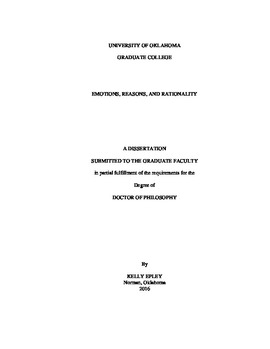| dc.description.abstract | Intuitively, emotion/judgment conflicts are irrational because they are disruptive. They create disturbances and divisions in our generally well-ordered and cohesive selves. When you fear the spider, even though you judge that it isn’t harmful to humans, you may recoil from its frightful appearance. You might also spend your mental and practical resources and devising a safe disposal of the pest with a long broom handle that keeps a comfortable distance between you and it, even though your judgment implies that such precautions aren’t necessary. Unless or until the conflict is resolved, each element of the conflict vies for influence over your thoughts and actions. In this dissertation, I give an account of emotion/judgment conflicts according to which they are conflicts of assent-bearing attitudes. As attitudes, emotions and judgments both entail rational commitments, at a minimum, to refrain from having inconsistent attitudes. Emotion/judgment conflicts violate these commitments.
A major objection to this view is that emotions appear to be inconsistently responsive to reasons that support altering or extinguishing it. Some emotions easily change in response to reflection, but some are highly recalcitrant. Therefore, emotions don’t obviously have the sort of relationship to reasons and reflection that our attitudes have. Attitudes are reason responding. In response to this objection, I argue that emotions do generally respond to reflection on our reasons, even in some cases in which they appear to be recalcitrant because they are unmoved by the reasons that formed the basis of our judgment. The modes of reflection that would be able to adjudicate the conflict are just the sorts that our emotional faculties respond to: attention redirection, information elaboration, and imagination. These modes of reflection can correct for hasty and myopic judgments as well as ill-founded emotions by widening our reasons set and recalibrating our weighting schemes. | en_US |
